#Carbon steel pipes
Text
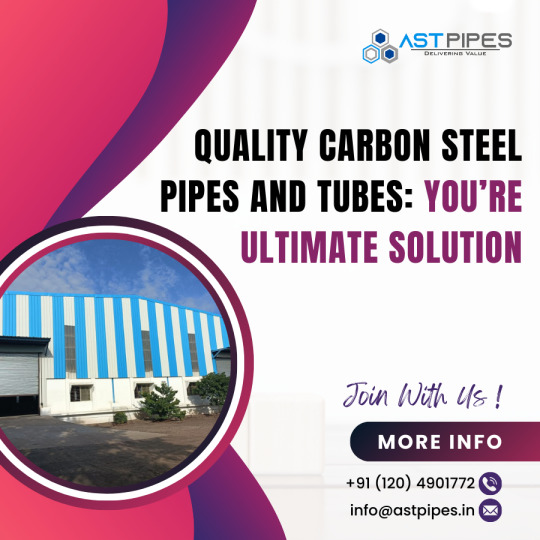
Quality Carbon Steel Pipes and Tubes: You’re Ultimate Solution
When it comes to carbon steel pipes and tubes, reliability is paramount. At our company, we offer a comprehensive range of products, including DOM tubes, CDW pipes, GP tubes, and galvanized pipes. With precision engineering and superior quality materials, our large diameter tubes and pipes ensure durability and performance in diverse applications. Trust us for your carbon steel needs, and experience unmatched reliability and efficiency in every product we deliver.
0 notes
Text
What is the difference between carbon steel and black steel pipes?
In the world of metalworking and construction, carbon steel and black steel pipes occupy significant roles. Both types of pipe have their unique characteristics and applications, but it is crucial to understand the key differences between carbon steel and black steel pipes to ensure the right material is used for each specific project.
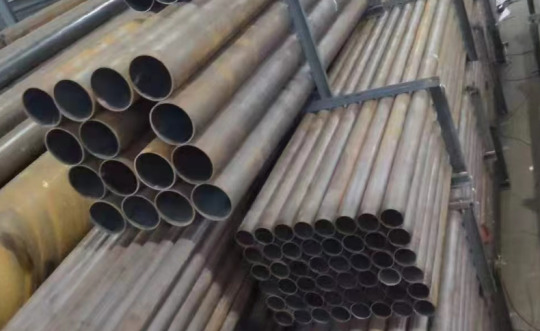
What is the difference between carbon steel and black steel pipes?
Firstly, let’s define what carbon steel is. Carbon steel is an alloy of iron and carbon, with the carbon content typically ranging from 0.2% to 2.1% by weight. This carbon content significantly affects the mechanical properties of the steel, including its hardness, tensile strength, and ductility. Carbon steel pipes are produced through various processes such as rolling, extrusion, or welding, depending on the desired shape and size. The carbon content can also be adjusted to meet specific performance requirements, making carbon steel pipes suitable for a wide range of applications from low-pressure plumbing to high-strength structural supports.
On the other hand, black steel pipe, as the name suggests, refers to steel pipe with a dark finish. This finish is usually the result of the pipe’s manufacturing process and is not necessarily indicative of its material composition. Black steel pipe is often made from carbon steel, but it can also be made from other alloys. The dark color is typically a result of the oxidation that occurs during the hot-rolling process, which gives the pipe its characteristic black appearance. Black steel pipe is commonly used in fire sprinkler systems, gas lines, and other applications where a durable and cost-effective material is required.
One significant difference between carbon steel and black steel pipes lies in their appearance and finish. Carbon steel pipe can be finished in various ways, including painting, galvanizing, or left with a bare metal finish, depending on the intended use. Black steel pipe, on the other hand, is typically uncoated and retains its dark oxide finish, which may require additional treatment or coating for specific applications.
In terms of mechanical properties, carbon steel pipes offer a wide range of strengths and ductilities depending on their carbon content and alloying elements. This versatility allows carbon steel pipes to be tailored for specific applications, whether they require high tensile strength or good impact resistance. Black steel pipe, while typically strong and durable, may not offer the same level of customization in terms of mechanical properties.
When it comes to corrosion resistance, both carbon steel and black steel pipes can be susceptible to rust and corrosion if not properly coated or treated. Carbon steel pipes can be galvanized or coated with protective layers to enhance their corrosion resistance, while black steel pipe may require similar treatments to improve its durability in corrosive environments.
Cost is another factor that distinguishes these two types of pipe. Black steel pipe is generally less expensive to produce due to its simpler manufacturing process and widespread availability. Carbon steel pipe, especially high-grade varieties, can be more expensive due to the additional alloys and processing required to achieve specific mechanical properties.
Conclusion
In conclusion, the difference between carbon steel and black steel pipes lies in their composition, mechanical properties, appearance, corrosion resistance, and cost. Carbon steel pipe offers a wide range of customization options and is suitable for applications that require specific mechanical properties. Black steel pipe, on the other hand, is a cost-effective and durable choice for many common construction and plumbing tasks.
Thank you for reading our article and we hope it can help you to have a better understanding of the differences between carbon steel and black steel pipes. If you are looking for carbon steel pipe suppliers and manufacturers online now, we would advise you to visit Huaxia Steel.
As a leading supplier of carbon steel pipes from Shanghai China, Huaxia Steel offers customers high-quality carbon steel, tool steel, alloy steel, and carbon steel tubes at a very competitive price.
0 notes
Text
Stainless Steel Pipe - A Comprehensive Guide
Stainless steel pipes are a versatile and durable option for various industrial and commercial applications. Their corrosion resistance, strength, and hygienic properties make them a reliable choice for plumbing, construction, and manufacturing needs.
Link : https://www.slideshare.net/slideshow/stainless-steel-pipe-a-comprehensive-guide/267125223
0 notes
Text
Carbon Steel Pipes and Drill Pipes - An Overview
Carbon steel pipes and drill pipes are essential components in many industrial applications. Carbon steel offers excellent strength and durability at an affordable price point, making it one of the most widely used metals.
Carbon steel pipes are made of carbon steel alloy containing iron and carbon. They come in various sizes and wall thicknesses for different pressure and temperature ratings. Common applications include plumbing, chemical plants, refineries, and oil & gas pipelines.
The higher carbon content increases the pipe's tensile strength and hardness. However, it also reduces ductility and impact resistance. Proper raw material selection and manufacturing processes like seamless rolling or electric resistance welding ensure optimal mechanical properties for the intended usage.
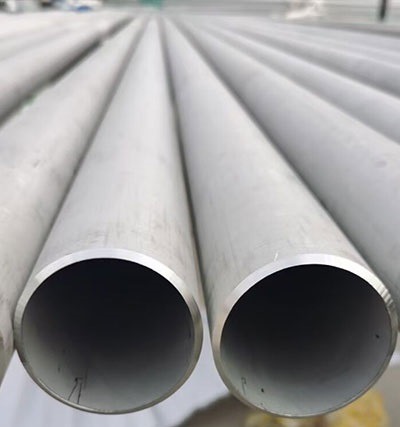
Drill pipes are a critical part of the drill string used in oil & gas drilling. They have a heavy-walled tubular section with threaded box and pin connections. Drill pipe transfers drilling fluid and torque to the drill bit during boring operations. They must withstand high tensile, torsional and internal pressure loads.
Drill pipes are manufactured from ultra-high strength low alloy carbon steels. They employ heat treatments like quenching and tempering to obtain the required hardness, strength and toughness. This enables them to tolerate extreme conditions during drilling.
Regular inspection and maintenance are crucial for carbon steel pipes and drill pipes due to wear & tear. Corrosion-resistant coatings, lubricants and thread protectors help extend service life. With proper care, carbon steel products offer excellent functionality at low ownership costs for industrial users.
0 notes
Text
Carbon Steel Pipe Manufacturers in India - Bright Steel Centre
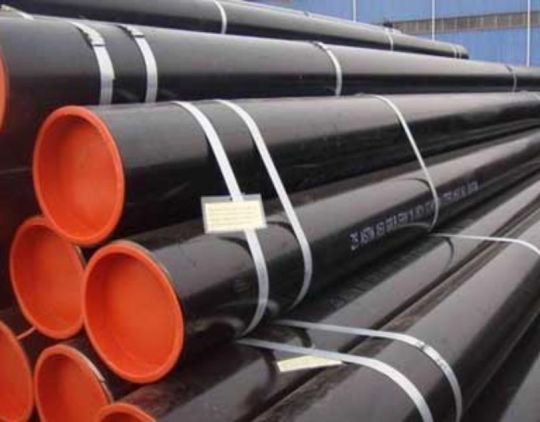
Bright Steel Centre is one of the Largest Carbon Steel Pipe Manufacturers in India. Our contribution to the quality exports and the expansion and development of the Indian market has been indispensable. To meet the demands of our prestigious customers, we manufacture ASTM A106 carbon steel pipe in various diameters, forms, and specifications. Carbon Steel Pipe are exceptionally resistant to corrosion and are getting cheaper all the time. People all across the world are aware of the quality and dependability of the CS pipe we supply.
As a leading Carbon Steel Pipe Manufacturers. There are several varieties of carbon steel pipes, including LSAW, seamless, ERW, welded, and fabricated pipes. They also have a wide range of sizes and forms, including round, square, rectangular, hydraulic, and many more.
The size range of ASTM A333 Carbon Steel Pipe is 1/8 NB to 30 NB IN. Our skilled staff will ensure that Carbon Steel Seamless Pipe and other items are manufactured and supplied in a way that preserves quality, including the selection of premium raw materials for processing into finished goods, marking, storage, packaging, and transportation. In addition, we provide stainless steel pipes, which come in a variety of grades & materials.
Product: Carbon Steel Pipes Manufacturer in India
Website: brightsteelcentre.com
#Carbon Steel Pipes Manufacturer in India#Carbon Steel Pipes Manufacturer#Carbon Steel Pipes#Carbon Steel Seamless Pipe#CS Pipe
0 notes
Text
Carbon Steel Pipes
Stay connected with top-notch Carbon Steel Pipes suppliers for reliable industrial solutions. Bookmark a comprehensive platform that offers a diverse range of carbon steel pipes for various applications. Keep abreast of the latest industry trends, certifications, and quality standards. Access seamless and welded carbon steel pipes for your specific needs.
0 notes
Text
Precision and Quality: DOM Tubes Manufacturers
Discover excellence with our DOM Tubes Manufacturers. As industry leaders, we produce top-grade Drawn Over Mandrel (DOM) tubes that guarantee precision and reliability. With cutting-edge manufacturing techniques, we deliver tubes that meet the most stringent requirements. Partner with us for unmatched quality.
#dom tube#hydraulic tubes#j525 tubes#astm-a519#seamless mechanical tubing (a519 tubing)#stainless steel pipe#Alloy Steel Pipe and Tube manufacturer and supplier#Carbon Steel Flanges Manufacturer#Carbon Steel Pipes#Duplex And Super Duplex pipes#stainless steel pipe suppliers#stainless steel pipe tubing#Stainless Steel Flanges Supplier#Low Temperature Carbon Steel Pipes#Duplex Steel Flanges#galvanized pipes#steel pipes manufacturer#galvanized pipe manufacturer#a519 tubing#astm a312 pipe#galvanized pipe suppliers#ppgl coil manufacturers#ppgl coil manufacturers in india#ppgi coil manufacturers in india#ppgi coil manufacturers.
0 notes
Text
Everything You Need to Know About Seamless Pipes
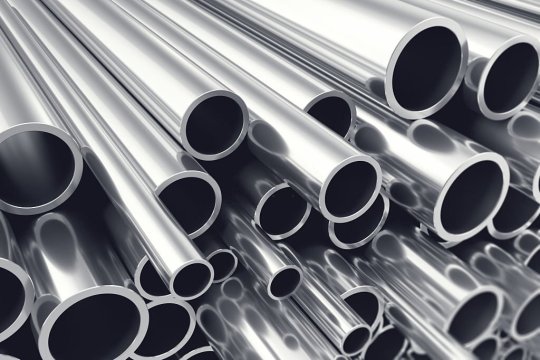
If you're looking for a comprehensive guide on seamless pipes, look no further. Our blog covers everything you need to know about seamless pipes, including their benefits, manufacturing process, and applications. Visit us now and learn more!
#seamless pipes#seamless tubes#stainless steel pipes#carbon steel pipes#welded pipes#seamless pipe manufacturer#seamless carbon steel pipes
0 notes
Text
An Overview of High Carbon Steel Pipe
High-carbon steel pipe is a type of pipe made from an alloy of iron and carbon. It is known for its increased strength and hardness compared to low-carbon steel pipe. This makes it an ideal choice for applications that require increased durability and resistance to wear and tear.
One of the main benefits of high-carbon steel pipe is its high strength. The high carbon content in the alloy gives it a higher yield strength and tensile strength than low-carbon steel pipe. This means it can handle higher loads and pressures without bending or breaking, making it suitable for use in high-pressure piping systems, such as those found in power plants and natural gas pipelines.
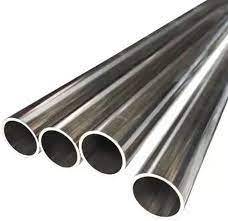
Another benefit of High-Carbon Steel pipe is its increased hardness. The high carbon content in the alloy gives it a higher Rockwell hardness rating, making it more resistant to wear and tear. This makes it suitable for use in applications where the pipe will be subject to abrasion or impact, such as in mining and drilling operations.
High-carbon steel pipe is also known for its increased wear resistance. It's specially treated to have increased resistance to abrasion and erosion, which makes it a great choice for use in applications where the pipe will be subject to continuous movements, such as in conveyor systems.
Additionally, high-carbon steel pipe has excellent heat resistance. It can withstand higher temperatures without losing its strength and shape, making it suitable for use in high-temperature environments, such as in boilers and heat exchangers.
High carbon steel pipe is also relatively easy to machine and can be welded using various methods such as gas metal arc welding (GMAW) and shielded metal arc welding (SMAW) making it a suitable material for custom fabrication and manufacturing.
However, one downside of a high-carbon steel pipe is that it may be more expensive than a low-carbon steel pipe. Additionally, high-carbon steel pipe has less ductility which makes it prone to cracking and brittle if it's not heat treated properly. This can be mitigated by proper heat treatment and design
In summary, a high carbon steel pipe is an ideal choice for applications that require increased strength, hardness, wear resistance, heat resistance and durability. It's suitable for use in high-pressure piping systems, mining and drilling operations, conveyor systems, high-temperature environments, and in custom fabrication and manufacturing.
0 notes
Text
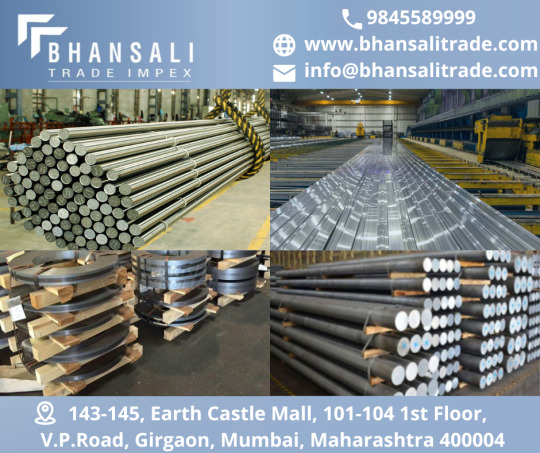
#stainless steel suppliers#stainless steel supplier#stainless steel#stainless#manufacturer#steel manufacturer#aluminium#titanium#stainless rod#stainless bars#carbon sheet#carbon steel rods#carbon steel bars#carbon steel pipes#carbon steel tubes#carbon steel coils#carbon#aluminium coils
0 notes
Text
Indian Manufacturers of Premium Quality Carbon Steel Pipes
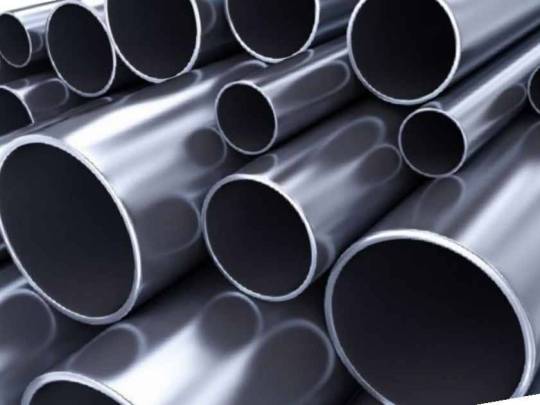
Kanak Metal & Alloys is one of India's most well-known Carbon Steel Pipes Manufacturers. We are a worldwide Carbon Steel Pipes supplier and dealer with a wide variety of Carbon Steel Pipes Products for sale. We are also one of the largest Carbon Steel Pipes Manufacturers in India.
For many decades, we are a leading Indian API 5L Pipes Manufacturers. We are a global API 5L Pipes Manufacturer and Dealer with a huge inventory of API 5L Pipes for sale. we are a prominent API 5L Pipes providers In India.
We are a famous Heavy Wall Thickness Pipe Manufacturer in India with a big inventory of Heavy Wall Thickness Pipe Products. We have dominated the Heavy Wall Thickness Pipe business in India for many decades.
For more information
Website: kanakmetals.com
Mails us: [email protected].
Product source: Carbon Steel Pipes Manufacturer in India, API 5L Pipes Manufacturers in India and Heavy Wall Thickness Pipe Manufacturer in India.
#Carbon Steel Pipes#Carbon Steel Pipes Manufacturers#Carbon Steel Pipes Manufacturer in India#Heavy Wall Thickness Pipe Manufacturer in India#Heavy Wall Thickness Pipe#Heavy Wall Thickness Pipe Manufacturer#API 5L Pipes Manufacturer in India#API 5L Pipes Manufacturer
1 note
·
View note
Text
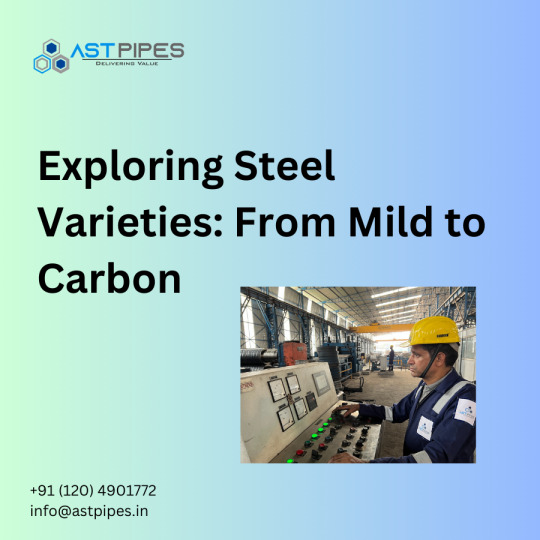
Dive into the world of steel with a variety of options to meet your needs. From mild steel sections to carbon steel pipes and tubes, we offer a range of choices. Dom tubes and pipes ensure strength and reliability, while CDW tubes provide precision engineering. GP and galvanized pipes offer corrosion resistance, and GI pipes ensure durability. For projects requiring robust solutions, large diameter pipes stand tall. Explore our steel options for your next endeavour.
#Mild steel section#carbon steel pipes#carbon steel tubes#dom tubes#dom pipes#cdw pipes#cdw tubes#gp pipe#gp tube#galvanised pipe
0 notes
Text
What is the difference between stainless steel and carbon steel pipes?
In the realm of metallurgy and engineering, stainless steel and carbon steel pipes occupy distinct niches, each with unique properties and applications. As a seasoned expert in the field of metal materials from Huaxia Steel, I will delve into the intricacies of these two alloys, highlighting their composition, characteristics, uses, and the critical differences that set them apart.
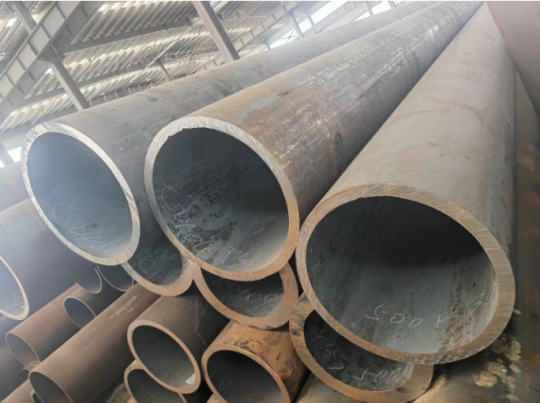
What is the difference between stainless steel and carbon steel pipes?
Firstly, let’s explore the composition of carbon steel pipe. Carbon steel, as the name suggests, primarily consists of iron and carbon. The carbon content, ranging from a low of approximately 0.2% to a high of 2.1% by weight, significantly influences the steel’s mechanical properties. Carbon steel pipes are widely used in various industries due to their high tensile strength, ductility, and relatively low cost. However, their susceptibility to corrosion, especially in wet or corrosive environments, is a significant limitation.
Contrastingly, stainless steel pipe is an alloy of iron, chromium, and other elements such as nickel and molybdenum. The key characteristic of stainless steel is its chromium content, typically at least 10.5% by weight. This chromium forms a thin, protective oxide layer on the steel’s surface, rendering it highly resistant to corrosion and oxidation. This inherent corrosion resistance is what gives stainless steel its “stainless” moniker and sets it apart from carbon steel.
The corrosion resistance of stainless steel pipe is not just a matter of durability; it also translates into longer lifespan and reduced maintenance costs in many applications. This is particularly true in industries that involve exposure to corrosive chemicals, saltwater, or high-humidity environments. Stainless steel pipes are thus preferred in the food processing, chemical, and marine industries, among others.
In terms of mechanical properties, both stainless steel and carbon steel pipes exhibit excellent strength and durability. However, stainless steel tends to be slightly less ductile and more difficult to work with than carbon steel, due to its higher alloy content. This added complexity in processing also contributes to the higher cost of stainless steel pipe compared to carbon steel.
Another key difference lies in the appearance and finish of these two types of pipe. Carbon steel pipe is often coated or painted to protect it from corrosion and enhance its aesthetic appeal. Stainless steel, on the other hand, is prized for its natural, sleek, and corrosion-resistant finish, which requires minimal maintenance to retain its appearance. This aesthetic quality makes stainless steel pipe a popular choice in architectural and decorative applications.
Cost is an important consideration when selecting between stainless steel and carbon steel pipes. Carbon steel pipe is generally more economical due to its simpler manufacturing process and widespread availability. Stainless steel, while offering superior corrosion resistance and aesthetics, comes with a higher price tag due to its complex alloy composition and manufacturing requirements.
Conclusion
In summary, the difference between stainless steel and carbon steel pipes lies in their composition, corrosion resistance, mechanical properties, appearance, and cost. Carbon steel pipe offers excellent strength and ductility at a competitive price, but its susceptibility to corrosion limits its use in certain environments. Stainless steel pipe, with its inherent corrosion resistance and aesthetic appeal, is the preferred choice for applications that demand both durability and visual appeal, despite its higher cost.
Thank you for reading our article and we hope it can help you to have a better understanding of the difference between stainless steel and carbon steel pipes. If you are looking for carbon steel pipe suppliers and manufacturers online now, we would advise you to visit Huaxia Steel.
As a leading supplier of carbon steel from Shanghai China, Huaxia Steel offers customers high-quality carbon steel, tool steel, alloy steel, and carbon steel tubes at a very competitive price.
0 notes
Text
Exploring The Versatility and Importance of Carbon Steel Pipes
Carbon steel pipes play a vital role in the exploration, production, and transportation of oil and gas. They are used for drilling, casing, and conveying hydrocarbons from wells to processing facilities, as well as for constructing pipelines and distribution networks.
Link : https://www.slideshare.net/slideshows/exploring-the-versatility-and-importance-of-carbon-steel-pipes/266744557
0 notes
Text
5 Latest Manufacturing Process of Heavy Wall Thickness CS Seamless Pipes
Heavy wall thickness CS seamless pipes are used in various applications, from oil and gas to construction and infrastructure. These pipes are known for their high strength, durability, and resistance to corrosion, making them an ideal choice for harsh environments.

The manufacturing process for heavy wall thickness CS seamless pipes involves several steps, each critical to the final product's quality.
Raw Material Selection: The first step in the manufacturing process is the selection of high-quality raw materials. Heavy wall thickness CS seamless pipes are typically made from carbon steel, which is known for its strength and durability. The steel is selected based on its chemical composition, mechanical properties, and other factors to meet the required specifications.
Billet Production: The next step is the production of billets and cylindrical steel pieces that serve as the starting point for the pipe-making process. The steel is heated to a high temperature and then rolled into a cylindrical shape. The resulting billet is cut to the desired length using a saw or other tool.
Piercing and Rolling: Once the billets have been cut to the desired length, they are ready for piercing and rolling. The billets are heated to a high temperature and then pierced with a mandrel, which creates a hollow tube. The tube is then rolled using a series of rollers to reduce its diameter and increase its length.
Heat Treatment and Finishing: After the piercing and rolling process, the tube is heat treated to improve its mechanical properties. The tube is heated to a high temperature and then quenched in water or oil to harden the steel. This process helps to improve the pipe's strength and durability. Once the heat treatment process is complete, the pipe undergoes finishing. This involves cutting the pipe to the desired length and removing excess material or burrs. The pipe is then inspected for quality control to ensure it meets the required specifications.
Testing and Certification: Before the heavy wall thickness CS seamless pipes are shipped to the customer, they undergo testing and certification. The pipes are subjected to various tests, including hydrostatic testing, ultrasonic testing, and visual inspection, to ensure they meet the required quality standards. Once the pipes have passed all required tests, they are certified and shipped to the customer.
In addition to the steps mentioned above, several other important factors must be considered in manufacturing heavy wall-thickness CS seamless pipes.

One of the key considerations is the quality of the equipment used in the production process. Modern equipment and technology, such as advanced rolling mills and heat treatment furnaces, can significantly improve the efficiency and quality of the process.
Another important consideration is the quality control measures throughout the manufacturing process. Strict quality control measures ensure that the pipes meet the required strength, durability, and corrosion resistance standards.
These measures can include regular inspections and testing throughout the production process and comprehensive final testing and Certification.
It is also worth noting that the manufacturing process for heavy wall thickness CS seamless pipes can vary depending on the specific application and customer requirements.
For example, some applications may require additional steps, such as surface treatment or coating, to enhance the pipe's corrosion resistance.
Overall, the manufacturing process for heavy wall thickness CS seamless pipes requires careful attention to detail and a commitment to quality at every step. By selecting high-quality raw materials, using modern equipment and technology, and implementing strict quality control measures, manufacturers can produce pipes that meet the most stringent requirements for strength, durability, and corrosion resistance.
For more such stories, kindly follow Tumblr.
#metal industrial#construction#stainless steel#architecture#alloy#buildings#carbon steel pipe#seamless pipe#heavy wall pipe#CS Seamless Pipes#Carbon Steel#SEAMLESS CARBON STEEL HEAVY WALL THICKNESS PIPES#ASTM A53 Heavy Wall Thickness Seamless Pipes#ASTM A106 Gr B Steel A53 Heavy Wall Thickness CS Seamless Pipe
2 notes
·
View notes
Text
Carbon Steel IBR Approved Pipes Manufacturer in India
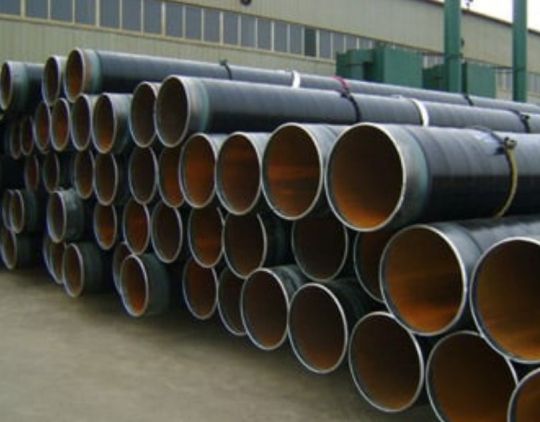
Bright Steel Centre is one of the Largest Carbon Steel IBR Approved Pipe Manufacturers in India. We have been an essential part of the growth and development of the Indian market and quality exports. We manufacture carbon steel IBR Approved pipe in various sizes and shapes and with different specifications per our valuable clients' requirements. Carbon Steel IBR Approved Seamless Pipes have very high corrosion resistance and are becoming more cost-effective frequently.
We are a leading Carbon Steel IBR Approved Pipe Manufacturers. They are also available in various forms such as Round, Square, Rectangular, Hydraulic, and many more. ASTM A333 IBR Approved Carbon steel pipe size range from 1/8″NB TO 16″NB IN. We have a professional team to maintain the quality of Carbon Steel Pipe and other products throughout the manufacturing and supply, i.e., selecting high-quality raw materials to process into a finished product, marking, storage, packaging, and transportation. We also supply ASTM A333 IBR Approved Carbon steel pipe, and also available in other materials & grades.
Product: Carbon Steel IBR Approved Pipes Manufacturer in India
Website: brightsteelcentre.com
#Carbon Steel IBR Approved Pipes Manufacturer in India#Carbon Steel IBR Approved Pipes Manufacturer#Carbon Steel IBR Approved Pipes#Carbon Steel Pipes
0 notes